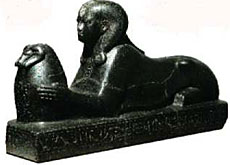Archaeologists discover black pharaoh trove

Swiss and French archaeologists have discovered ancient granite statues of the Nubian kings, known as the black pharaohs, in northern Sudan.
The team from Geneva University uncovered the “exceptional” trove while excavating along the Nile Valley.
The Swiss archaeologist and head of the expedition, Charles Bonnet, described the statues and monuments as sculptural masterpieces.
“The quality of the work means they are real masterpieces of this period and for the history of art the discovery is fabulous,” Bonnet told swissinfo.
The Nubian kings ruled over an empire that stretched along the Nile Valley about 2,500 years ago.
Worldwide importance
Bonnet was excavating a site about 500 kilometres north of the Sudanese capital Khartoum when he came across a small piece of stone. He began to clear away the sand and eventually revealed a huge, two metre-long statue.
The name Taharqa was inscribed on it, one of the principal kings of ancient Sudan. Bonnet and his French colleague, Dominique Valbelle, continued to dig and discovered a pit filled with finely carved, granite statues.
“It was really fabulous,” Bonnet said of the find, which he believes is of worldwide importance and “represents a significant contribution to the history of ancient Sudan”.
Well preserved
The archaeologists were impressed by how well the statues – which date back to approximately 600 BC – had been preserved in the ground.
There were seven stone carvings, including the kings Taharqa and Tanoutamon – who were the last black pharaohs – and the sovereigns Senkamanisken and Aspelta.
The Nubians ruled over the Kingdom of Kush, a land that included ancient Egypt. However, they were eventually conquered by their northern neighbours who smashed the statues to obliterate signs of Nubian rule.
“The statues were broken… when an Egyptian king tried to unify Egypt and destroy these figures,” Bonnet explained.
Police guard
Since the discovery, hundreds of people have flocked to the archaeological site while police stand guard to protect the pieces of history.
Bonnet said he would now try to work out a way to transport the heavy granite statues to a place where he and his team can begin documenting them.
Then they will attempt to restore the statues and monuments to their former glory so that the general public – and modern-day Nubians – can learn more about this era and its culture.
swissinfo, Samantha Tonkin
A team from Geneva University has found six stone carvings of Nubian kings, known as the black pharaohs, during an excavation along the banks of the Nile in Sudan.
The carvings date back to 600 BC, when the Nubians ruled over the Kingdom of Kush.
The archaeologists say the find counts among the world’s sculptural masterpieces.

In compliance with the JTI standards
More: SWI swissinfo.ch certified by the Journalism Trust Initiative








You can find an overview of ongoing debates with our journalists here . Please join us!
If you want to start a conversation about a topic raised in this article or want to report factual errors, email us at english@swissinfo.ch.